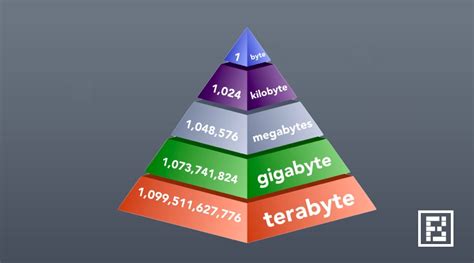Kb Vs Mb Which Is Bigger

When it comes to measuring digital storage and data transfer, understanding the difference between kilobytes (KB) and megabytes (MB) is essential. Both units are part of the binary prefix system used in computing, but they represent significantly different amounts of data. To grasp which is bigger, let's break down what each unit represents.
A kilobyte (KB) is a unit of digital information that equals 1,024 bytes. Bytes are the basic units of measurement for digital information, where each byte can represent a single character, such as a letter or a number. The kilobyte is often used to measure the size of small files, like text documents or low-resolution images.
On the other hand, a megabyte (MB) is a much larger unit, equal to 1,024 kilobytes (KB). This means that one megabyte is 1,024 times larger than one kilobyte, or 1,048,576 bytes. Megabytes are commonly used to measure the size of larger files, such as high-resolution images, audio files, and small to medium-sized video files.
Key Points
- A kilobyte (KB) equals 1,024 bytes, used for measuring small files like text documents.
- A megabyte (MB) equals 1,024 kilobytes or 1,048,576 bytes, used for larger files like images and audio files.
- Megabytes are significantly larger than kilobytes, with 1 MB being 1,024 times bigger than 1 KB.
- Understanding the difference is crucial for managing digital storage and data transfer efficiently.
- Both units are fundamental in the binary prefix system used in computing.
Practical Applications and Conversion

In practical terms, the difference between kilobytes and megabytes is substantial. For example, a small text file might be a few kilobytes in size, whereas a high-quality photo could be several megabytes. Understanding these units helps in assessing how much storage space is needed for files and how long it might take to transfer them over a network.
Converting between kilobytes and megabytes is straightforward: to convert kilobytes to megabytes, you divide the number of kilobytes by 1,024. Conversely, to convert megabytes to kilobytes, you multiply the number of megabytes by 1,024. This conversion factor is essential for accurately assessing and managing digital data.
Storage and Data Transfer Considerations
When considering storage devices like hard drives, solid-state drives (SSDs), or cloud storage, understanding the capacity in terms of megabytes or gigabytes (where 1 GB = 1,024 MB) is crucial. For instance, a 1 TB (terabyte) hard drive, which equals 1,024 GB or 1,048,576 MB, can store a vast number of files, but the exact number depends on the size of each file in megabytes or kilobytes.
Data transfer speeds, measured in megabits per second (Mbps) or gigabits per second (Gbps), also rely on understanding the size of files in megabytes or kilobytes. Knowing the size of the files you're transferring and the speed of your internet connection helps in estimating how long the transfer will take.
| Unit | Equivalent | Common Use |
|---|---|---|
| Kilobyte (KB) | 1,024 bytes | Text documents, small images |
| Megabyte (MB) | 1,024 KB or 1,048,576 bytes | High-resolution images, audio files, small videos |
| Gigabyte (GB) | 1,024 MB | Large files, movies, operating systems |

Conclusion and Future Perspectives

In conclusion, while both kilobytes and megabytes are essential units of measurement in the digital world, megabytes are significantly larger. As technology advances and files become larger and more complex, understanding these units and their differences becomes even more critical. Whether you’re managing personal files, working with multimedia content, or simply trying to understand how much storage you need, knowing the difference between KB and MB is fundamental.
Looking to the future, as files continue to grow in size due to higher resolutions and more complex data types, the distinction between these units will remain crucial for efficient data management and transfer. Moreover, with the rise of cloud computing and high-speed internet, the ability to accurately assess and manage digital storage will become increasingly important for both individuals and organizations.
What is the main difference between a kilobyte and a megabyte?
+A megabyte is 1,024 times larger than a kilobyte. One kilobyte equals 1,024 bytes, while one megabyte equals 1,024 kilobytes or 1,048,576 bytes.
How do I convert kilobytes to megabytes?
+To convert kilobytes to megabytes, divide the number of kilobytes by 1,024. For example, 2,048 KB is equal to 2 MB.
What are common uses for megabytes versus kilobytes?
+Megabytes are commonly used for larger files like high-resolution images, audio files, and small videos, while kilobytes are often used for smaller files like text documents and low-resolution images.



